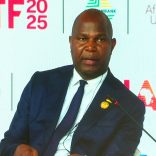FATF expected to remove Mozambique from "grey list" in September
Fantasy banking and the flight path from debt – Colin Waugh

One thing that usually happens in the wake of a serious car crash, train wreck or other public disaster, is that after the victims have been tended to and the news reports written, the lawyers come in. In legal terms almost everything costs money to put right, whether the harm is physical or moral or both, and in countries with working justice systems where a rule of law applies, blame can be legally attributed and financial, if not criminal sanctions appropriately brought to bear.
What has been revealed in the past month or two about Mozambique’s international borrowing activities since 2012 certainly now qualifies as a disaster, a kind of very slow train wreck, where the front car has already hit the buffers at high speed but most of the passengers are still in a state of suspended terror, careening inexorably towards a nasty end but without knowing quite how to prepare.
An unlikely-looking 2013 tuna-fishing loan offering for $500m was the first sign for most outside observers that something unusual was going on, which indeed it was. By the time Mozambique was finished handing over its ‘real’ loan books to the IMF in April 2016 it had become clear that some four times that amount had been borrowed by various quasi-public entities, mostly undeclared both to its people and its partners with the majority for military and closely related hardware purchases.
In the public arena, both domestically in Mozambique and in the creditors’ jurisdictions the legal investigation stage is just beginning. Facts were not given to lenders, at the outset, clearly. Those lenders’ representatives, the investment banks whose job it is to protect their clients’ interests, didn’t ask very many questions. The unwitting ‘guarantors,’ the people of Mozambique, were also oblivious. Later, verbal assurances at the highest levels about the similar facts were given again and relied upon by those whose responsibility it should have been to check.
Credit Suisse, the main western private lending institution involved in the EMATUM loan is no newcomer to out-of-the ordinary international loan deals. So why did its senior management wave EMATUM through in 2013, together with a second, clandestine, privately-arranged loan of similar proportions, without performing greater due diligence on the borrower and the likely true quality of the credit? Several major asset management companies in the West, household names in finance, subsequently repackaged Mozambique’s ‘sovereign guaranteed’ debt and resold it to doctors, schoolteachers and pensioners as a secure investment. Most of the latter would today not use the term ‘secure’ to describe what they have in their portfolios in relation to that Mozambican exposure.
The IMF itself, who by now must know the bumps and buracos of the credit terrain in Mozambique as well as any, in its periodic Mozambique macroeconomic reports, as late as 2015 was still making relatively mild references to a ‘need to restrain rising public debt’ while alarm bells should surely have been jangling loudly in Maputo if not in Washington DC. Specific references to EMATUM were often omitted, with reviews preferring to resort to blander macroeconomic language about ‘improvements needed in fiscal management,’ etc.
The reality is that for these latter institutions, as well as Russian co-EMATUM lender VTB, $1bn or $2bn may not really be worth such an extensive due diligence process. If the investors are keen and the vehicle can be put together for an attractive fee with limited fuss, why not go ahead? After all, at around the same time, in early 2014, Credit Suisse settled a tax-evasion scheme law suit with the US authorities for $2.6bn, and has been in and out of court with the US government for smaller amounts for much of the past 8 years since the financial crisis. A slightly dodgy billion or two for Mozambique would probably not have clanged too many cow bells at corporate headquarters against such a backdrop.
Long skirts, short memories
Casting about elsewhere in the current universe of improperly obtained credit, we still have none other than Greece, who once again this month will seek major cash injections to stay financially afloat as part of its negotiated Euro 86 billion loan package, for sure a far greater concern for the IMF right now than Mozambique. It may be that, just as successive financial crises of the past decades gave birth to the phrase ‘’too big to fail’’ referring to major banks’ lending exposures on US collateralized mortgage debt, for example, when it comes to Mozambique, the correct phrase may be ‘‘too small to worry.’’
But Mozambicans should worry, because their debt burden is out of control and instead of pretending that they didn’t know until this year that it had taken on such massive proportions, the time has come for the inner circle of government to come clean and also to take their share of responsibility for getting out of the quagmire. People are genuinely concerned about public morality in the financial management of their country. It takes more to inspire moral confidence in leadership than imposing long skirt policies in educational institutions; financial accountability is important too.
Waiting for the inevitable legal ‘default’ on the debt, however that is defined, would create an unnecessary delay because when it is clear, as it is now, that both borrowers and lenders have behaved improperly, the legal status of the loans themselves becomes almost secondary and as already seen, potentially very renegotiable depending on the outcome of current donor demands for a proper investigation.
A renowned New York-based lawyer with deep experience in advising governments on rescheduling after default, Lee Buchheit, says that a common factor in every country he has worked for is initial denial. In a recent financial Times interview he said:
“They all realised far too late the extent of their problems,” he says. “And when they did it was too late to arrange an orderly readjustment of the debts.”
It is clear that Mozambique’s financial decision makers were in denial about the gravity of their debt decision making over the past two years and from the recent public pronouncements of top officials regarding disclosure, it appears that the cloud of denial has yet to fully dissipate.
Whether or not a proper accounting for the funds mis-borrowed in Mozambique and mis-lent in Europe is ever forthcoming, there are precedents that indicate there may be ways out that could help reduce the future financial pain for the country.
While in recent years more advanced country borrowers that were massively overextended like Argentina had to officially default on their loans, smaller, less well known borrowers such as Ecuador have argued that their debts were ‘illegitimate’ and refused to pay back, as they did in their 2008 default with the assistance of international debt lawyers. At the time Ecuador’s president Correa described his country’s bankers as ‘’monsters’’ and ordered his central bank to stop paying any interest on their loans, thereby defaulting on $3.2bn of debt. Sure enough, six years later in 2014, Ecuador was back in the international bond markets, offering $700m of bonds at 7% to yield hungry international investors. Sounds familiar? Short memories.
By: Colin Waugh
- Colin Waugh is a financial economist and investor based in Maputo












Leave a Reply
Be the First to Comment!
You must be logged in to post a comment.
You must be logged in to post a comment.